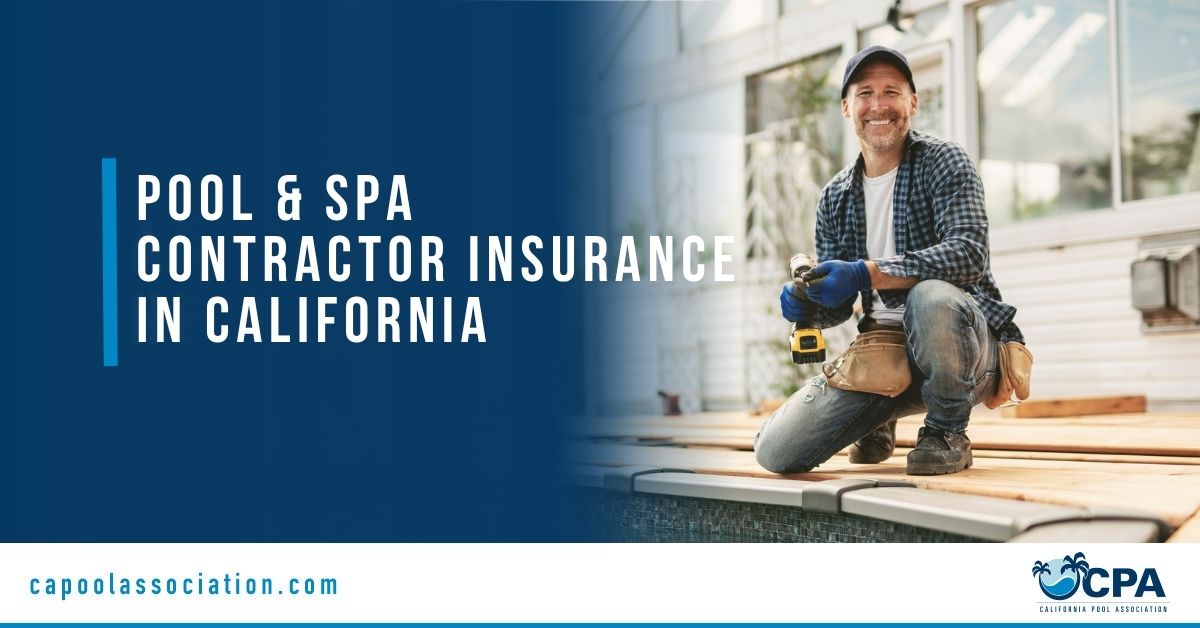
Pool and spa contractors face specific risks: handling chemicals, excavation near homes, structural work, and finished-job liabilities. This 2025 update explains the coverages that matter most in California, the current licensing and bond rules, and the day-to-day implications for contractors and their clients. A short section at the end adds practical checklists for Florida, Arizona, Texas, and New York.
Standard contractor policies often exclude the very scenarios pool/spa firms face most—chemical spills, damage during acid washes, “pool pop-up” after draining, and certain faulty-work claims. Without the right endorsements, one incident can threaten cash flow, jobs in progress, and reputation with homeowners and commercial clients.
| Coverage | What it does | Why it matters here |
|---|---|---|
| Commercial General Liability (CGL) | Third-party injury/property damage from your operations. | Many basic CGL forms exclude pollution events and damage to the part you’re working on; pool work relies on endorsements to fill these gaps. |
| Pollution/Environmental Liability | Bodily injury, property damage, and cleanup costs from chemical spills or releases. | Chlorine, acids, and other chemicals are routine; basic CGL commonly excludes pollution, so dedicated coverage is key. |
| “Pool Pop-Up” and Acid-Wash Damage Endorsements | Covers structural movement after draining and surface damage during treatments. | Shifting water tables and older plaster make these loss types both real and costly. |
| Completed Operations (often part of CGL) | Losses that occur after the job is finished (e.g., leaks from improper install). | Protects against “we’re done” claims that show up months later. |
| Professional Liability (E&O) | Design, consulting, or inspection errors that cause a financial loss. | If you inspect, design, or sign off on others’ work, standard CGL won’t cover professional services exposure. |
| Workers’ Compensation | Employee medical/wage benefits for work injuries; satisfies state mandates. | Manual labor, equipment, and chemicals create frequent WC exposures; California has specific filing rules with CSLB. |
| Commercial Auto (BAP) | Liability and vehicle damage for business-used autos; options for hired/non-owned. | Personal auto policies often restrict or exclude business use; pool trucks carry tools and chemicals daily. |
| Tools/Equipment (Inland Marine) | Covers mobile equipment and tools on job sites, in transit, or off-premises. | Keeps operations moving after theft or damage to pumps, vacuums, mixers, etc. |
| Cyber & Crime | Data breach costs, funds transfer fraud, employee theft. | Card payments, scheduling apps, and client records make small firms targets. |
| Surety Bonds | Guarantees performance/compliance required by licensing or contracts. | California contractors must maintain a CSLB license bond; commercial jobs may require performance/payment bonds. |
License & classification. Swimming pool construction in California typically falls under the C-53 Swimming Pool Contractor classification. Jobs of $500 or more require a state contractor license.
| California Item | Current (2025) Essentials | Why it matters to contractors & clients |
|---|---|---|
| Contractor License Bond | $25,000 surety bond filed with CSLB; must match business/legal details exactly. | Protects consumers; required to keep your license active and avoid disciplinary issues. |
| Workers’ Compensation Filing | Evidence of WC insurance (or a valid exemption where allowed) must be on file with CSLB; certificate must list CSLB as Certificate Holder. | Keeps you compliant and able to pull permits, pass license checks, and hire legally. |
| Commercial Auto (BAP) | Business-use autos should be on a BAP; consider hired/non-owned endorsements. | Personal policies often exclude business activity—protects after a crash with chemicals or equipment onboard. |
| CGL + Endorsements | Review pollution exclusions, “damage to your work,” and add pool-specific endorsements (pop-up, acid-wash, faulty work sublimits) as available. | Prevents gaps that commonly lead to denied claims in pool work. |
| Standards & Codes | Follow PHTA/ICC standards and local code updates (e.g., ANSI/PHTA/ICC-5:2025 for residential inground pools). | Demonstrates due care; strengthens defenses if a claim alleges unsafe design/installation. |
Day-to-day impact. Keeping bonds and WC current avoids licensing holds. Using a BAP for service trucks helps after at-fault crashes. Endorsing your CGL for pollution, acid-wash, and pop-up avoids unpleasant surprises when an adjuster reads exclusions.
You remain responsible to the owner. Before a sub starts: obtain certificates, confirm active WC and CGL, and request additional insured status with primary and non-contributory wording and a waiver of subrogation where required by contract. Many CGL policies also include conditions for using subs—meet them to keep coverage intact.
| Item | Notes |
|---|---|
| License | Certified or Registered Pool/Spa Contractor through DBPR/CILB; experience, exam (or endorsement), financial responsibility, background checks. |
| Insurance | Maintain required liability and WC per DBPR; keep evidence current for license. |
| Scope reminders | Specialty pool contractors have limited scopes and often cannot contract directly with the public. |
| Item | Notes |
|---|---|
| License | ROC classification (e.g., CR-37 Swimming Pool); separate commercial/residential/dual license types. |
| Bond | License bond required; amounts vary by license type and reported gross volume (e.g., residential general contractor bond $9k <$750k; $15k ≥$750k). |
| Item | Notes |
|---|---|
| Electrical scope | Residential Appliance Installer (RAI) license covers pool-related electrical on the load side; line-side work requires a licensed electrical contractor with a master electrician. |
| Business license | Residential Appliance Installation Contractor license for firms offering that work; local building permits still apply. |
| Item | Notes |
|---|---|
| License | NY licenses are typically local. In NYC, a Home Improvement Contractor license is required for residential work affecting property. |
| Bond | NYC requires a $20,000 license bond (or participation in an alternate trust fund) to obtain/maintain the license. |